|
|
|
Sort Order |
|
|
|
Items / Page
|
|
|
|
|
|
|
| Srl | Item |
| 1 |
ID:
159181
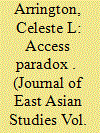

|
|
|
|
|
| Summary/Abstract |
To what extent is a diverse news media environment good for activists who seek attention for their cause? Scholars agree that activist groups depend on the media to reach policymakers and bystanders. Yet prior scholars have overlooked how factors that contribute to media environment diversity—including journalistic norms, market structures, outlets’ partisanship, and audiences’ news consumption habits—can have contradictory implications for activist groups. Disaggregating questions of gaining publicity from questions of the message and reach of coverage, this article shows that while pluralistic media environments are more accessible to activists, more homogeneous media environments help groups that manage to break into the mainstream news reach wider audiences with more coherent narratives. These findings challenge common assumptions about the news media in Japan and Korea. A paired comparison of hepatitis C-related activism in both countries demonstrates how the forces democratizing access to the media are paradoxically reducing the persuasive potential of publicity.
|
|
|
|
|
|
|
|
|
|
|
|
|
|
|
|
| 2 |
ID:
171350
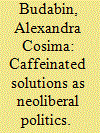

|
|
|
|
|
| Summary/Abstract |
How do celebrities exert power to influence elite and popular thinking and policy around peace and development? Drawing from research on neoliberalism, celebrities, and ethical consumption, I build an interpretive analysis of two case studies of Brand Aid initiatives to argue first, that celebrities mobilize financial and political capital to create partnerships across businesses, NGOs, and the government in ways that embody neoliberal politics by ushering in new private actors; and second, that celebrities reinforce these neoliberal politics by promoting these partnerships to popular and elite audiences. I discuss how this paper contributes to unmasking neoliberal trends by showing how celebrities are deepening their engagement in ways that hold implications for democratic politics.
|
|
|
|
|
|
|
|
|
|
|
|
|
|
|
|
| 3 |
ID:
132978
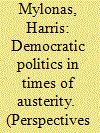

|
|
|
|
|
| Publication |
2014.
|
| Summary/Abstract |
Few people have been shielded from the recent financial crisis and fewer still have suffered more than the Greeks. With unemployment rates above 27 percent, youth unemployment just below 60 percent, 25 percent shrinking of the GDP since 2009, higher taxes, lower wages and pensions, and only modest price deflation in the market, it is hard to be optimistic about a quick economic recovery. From Stagnation to Forced Adjustment provides a thorough discussion of the chronic pathologies that rendered Greece the weakest link during the Eurozone crisis. The book's contributors consider a range of explanations for "reform stagnation" in Greece despite the presence of seemingly favorable institutional conditions since the transition to democracy in 1974-a unitary state with stable one-party governments, cohesive parties, and few veto players. The theme of the volume is that lack of reform is causally related to the intense financial crisis that led to the sovereign debt crisis in Greece. The authors suggest that the crisis occured because of contextual factors that did not allow reforms to function properly or in some cases to be implemented at all. By setting the current crisis in a broader historical and political context, the book makes possible a deeper understanding of the developments surrounding it. And a review of this book provides an opportunity to also consider the broader meaning of the Greek crisis, which poses important questions for the future of democracy in the Eurozone.
|
|
|
|
|
|
|
|
|
|
|
|
|
|
|
|
| 4 |
ID:
126760
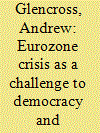

|
|
|
|
|
| Publication |
2013.
|
| Summary/Abstract |
This article explores how both the sovereign debt crisis and the European Union's response illustrate fundamental characteristics of contemporary European integration. In the face of an unexpected emergency, national politicians took the lead and pressed ahead with more integration. The long-term results though depend on national acceptance of not just the bailout provisions but also enforcement of debt brakes mandated by the new EU treaty. This means democratic politics at the national level will continue to have a fundamental influence on EU affairs, while the North/South split will co-exist alongside a more marked separation between countries inside and outside the Eurozone. In this context of increased political turbulence within the EU, there is likely to be only a limited window of opportunity for successful negotiation of a free-trade deal with the United States.
|
|
|
|
|
|
|
|
|
|
|
|
|
|
|
|
| 5 |
ID:
103316
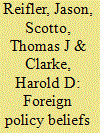

|
|
|
|
|
| Publication |
2011.
|
| Summary/Abstract |
This paper examines the structure and domestic political relevance of foreign policy beliefs in contemporary Britain. Confirmatory factor analyses (CFA) of data gathered in five national surveys conducted between May and September 2008 show that the British public's foreign policy beliefs are organized by two latent factors, which we label Liberal Internationalism and British Militarism. These factors closely resemble those reported in studies of the foreign policy beliefs of the American public. Analyses reveal significant covariation between the two foreign policy belief factors and voting intentions, as well as with partisanship and feelings about party leaders-key predictor variables in voting behavior models. These relationships remain significant in the presence of several controls, including measures of incumbent government performance in domestic and foreign policy domains. Demonstrating that foreign policy beliefs matter for the fates of political parties and their leaders helps to explain how public opinion in democratic politics affects the conduct of international relations.
|
|
|
|
|
|
|
|
|
|
|
|
|
|
|
|
| 6 |
ID:
123836
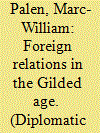

|
|
|
|
|
| Publication |
2013.
|
| Summary/Abstract |
This article examines the influence of Victorian free-trade ideology upon American foreign relations. Victorian free-trade ideology-also known as Cobdenism-gained ground among a small but powerful group of predominantly New England intellectuals. These American Cobdenites became members of the Cobden Club of England, a club that sought to spread free trade throughout the world and was thus seen as a threat to American protectionism. Many of these American Cobdenite members also exerted previously unrecognized influence at both the governmental and nongovernmental level upon Republican and Democratic politics. Cobdenism is nearly absent from American foreign relations historiography. Yet Anglophobic economic nationalists at the time viewed such influence as a transatlantic free-trade conspiracy. By investigating this controversy, I argue that Cobdenism greatly affected Gilded-Age foreign and domestic policies, particularly regarding American attempts at instituting freer trade, maintaining the gold standard, informal imperialism, and developing more amicable Anglo-American relations.
|
|
|
|
|
|
|
|
|
|
|
|
|
|
|
|
| 7 |
ID:
098993
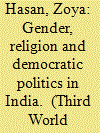

|
|
|
|
|
| Publication |
2010.
|
| Summary/Abstract |
This article examines the impact of identity politics on gender equality. More specifically it explores the paradoxical and complex relationship of religion and politics in a multi-religious society and the complicated ways in which women's activism has both reinforced and challenged their gender identities. Contrary to the argument that religious politics does not always negate gender equality, the article argues that the Hindu religious politics and women's activism associated with it provides a compelling example of the instrumentalisation of women to accomplish the political goals of the Hindu right. It also examines the approach and strategies of influential political parties, women's organisations and Muslim women's groups towards legal reform and the contested issue of a uniform civil code. Against those who argue that, in the current communal conjuncture, reform within Muslim personal laws or Islamic feminism is the best strategy for enhancing the scope of Muslim women's rights, the article argues that such an approach tends to freeze identities within religious boundaries. It shows how women's and minority rights are used within the politics of religion to sideline the agenda of women's rights.
|
|
|
|
|
|
|
|
|
|
|
|
|
|
|
|
| 8 |
ID:
114978


|
|
|
|
|
| Publication |
2011.
|
| Summary/Abstract |
Over the last two decades, there has been a 'democratic turn' in peace and conflict research, that is, the peculiar impact of democratic politics on a wide range of security issues has attracted more and more attention. Many of these studies are inspired by Immanuel Kant's famous essay on 'Perpetual Peace'. In this article, we present a critical discussion of the 'democratic distinctiveness programme' that emerged from the Democratic Peace debate and soon spread to cover a wider range of foreign policy issues. The bulk of this research has to date been based on an overly optimistic reading of a 'Kantian peace'. In particular, the manifold forms of violence that democracies have exerted, have been treated either as a challenge to the Democratic Peace proposition or as an undemocratic contaminant and pre-democratic relict. In contrast, we argue that forms of 'democratic violence' should no longer be kept at arm's length from the democratic distinctiveness programme but instead should be elevated to a main field of study. While we acknowledge the benefits of this expanding research programme, we also address a number of normative pitfalls implied in this scholarship such as lending legitimacy to highly questionable foreign policy practices by Western democracies. We conclude with suggestions for a more self-reflexive and 'critical' research agenda of a 'democratically turned' peace and conflict studies, inspired by the Frankfurt school tradition.
|
|
|
|
|
|
|
|
|
|
|
|
|
|
|
|
| 9 |
ID:
118212
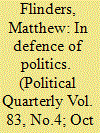

|
|
|
| 10 |
ID:
102068
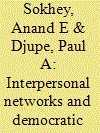

|
|
|
| 11 |
ID:
125167


|
|
|
|
|
| Publication |
2013.
|
| Summary/Abstract |
Iraq's indigenous forces for stability seem unlikely to be able to hold the levee themselves, but among the external players only Iran, ironically, seems willing to exert itself to help avoid a catastrophe.
|
|
|
|
|
|
|
|
|
|
|
|
|
|
|
|
| 12 |
ID:
145377
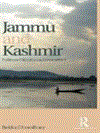

|
|
|
|
|
| Publication |
New Delhi, Routledge, 2016.
|
| Description |
xv, 259p.hbk
|
| Standard Number |
9781138653399
|
|
|
|
|
|
|
|
|
|
|
|
Copies: C:1/I:0,R:0,Q:0
Circulation
| Accession# | Call# | Current Location | Status | Policy | Location |
| 058687 | 320.9546/CHO 058687 | Main | On Shelf | General | |
|
|
|
|
| 13 |
ID:
046589
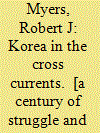

|
|
|
|
|
| Publication |
Hampshire, Palgrave, 2001.
|
| Description |
vii, 200p.hbk
|
| Standard Number |
0312238150
|
|
|
|
|
|
|
|
|
|
|
|
Copies: C:1/I:0,R:0,Q:0
Circulation
| Accession# | Call# | Current Location | Status | Policy | Location |
| 045072 | 951.904/MYE 045072 | Main | On Shelf | General | |
|
|
|
|
| 14 |
ID:
132738
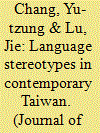

|
|
|
|
|
| Publication |
2014.
|
| Summary/Abstract |
We collected original experimental data, using the matched-guise technique, to examine the Taiwanese people's evaluational reactions to two major spoken languages in contemporary Taiwan: Mandarin and Taiwanese. Taking advantage of the effectiveness of the experimental technique in controlling for possible unobserved confounding variables, we clearly and systematically demonstrate that (1) language stereotypes do exist in today's Taiwan, and (2) there are some serious and significant implications for Taiwan's public opinion and democratic politics. Our data show that such language stereotypes are of great salience and consistently decoded for political issues, less so for socioeconomic issues, and almost insignificant for personality features. Our data also confirm that these language stereotypes are not just proxies of Taiwan's regional divisions; the Taiwanese people cognitively differentiate between the spoken languages' political and socioeconomic implications (despite some mild halo effect between the two).
|
|
|
|
|
|
|
|
|
|
|
|
|
|
|
|
| 15 |
ID:
128427
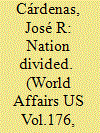

|
|
|
|
|
| Publication |
2014.
|
| Summary/Abstract |
A year after the death of Hugo Chávez from cancer, Venezuela remains as polarized as at any time during the flamboyant strongman's fourteen-year rule. As the dysfunctional economy he bequeathed to his successors continues to unravel-despite proven oil reserves rivaling those of Saudi Arabia-a determined political opposition continues its uphill fight against what Chávez designed as a permanent revolution. President Nicolás Maduro, Chávez's anointed successor, came to power in a special election last April that was much closer than expected, sending shock waves through the chavista ranks. There were enough doubts about the legitimacy of the vote that his opponent, Henrique Capriles, never conceded. Since then, Maduro has struggled to escape Chávez's shadow and assert his authority over the faction-ridden chavista party, the PSUV, a hodgepodge of leftists of all stripes along with a faction of the military loyal to the late president. Maduro has been buffeted by one challenge after another: infrastructure breakdowns leading to electricity shortages, scarcity of basic consumer items, rampant inflation, declining production, an overvalued currency (the black-market rate for dollars is ten times higher than the official exchange), and rampant street crime.
|
|
|
|
|
|
|
|
|
|
|
|
|
|
|
|
| 16 |
ID:
131538
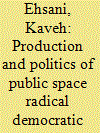

|
|
|
|
|
| Publication |
2014.
|
| Summary/Abstract |
These are critical times for democratic politics from Morocco to Iran, as heterogeneous popular movements for greater representation and social justice increasingly challenge established authorities. It is not surprising that these struggles have laid claim to symbolic urban places in the process of claiming their collective political demands. Politics is not purely discursive or institutional; it always has material and spatial dimensions, which for democratic politics is manifested through public space. For all the recent enthusiasm about the emancipating possibilities of the digital media, the fact remains that Tahrir Square (Cairo), Gezi Park (Istanbul), Revolution Street (Tehran), and Pearl Roundabout (Manama) are not virtual locations on the Internet.
|
|
|
|
|
|
|
|
|
|
|
|
|
|
|
|
| 17 |
ID:
053827
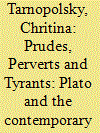

|
|
|
| 18 |
ID:
133229
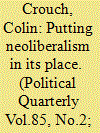

|
|
|
|
|
| Publication |
2014.
|
| Summary/Abstract |
Neoliberalism is not as popular as its opponents seem so much to fear; in democratic politics it nearly always hides behind other ideologies and policy types, as its essential message that we should pursue no goals that cannot be achieved through the market is intrinsically unattractive to the majority of people. Its power lies in the wealth of its key supporters, and in the difficulty of raising coordinated opposition to it among post-industrial populations that have little sense of their political interests. The main base for hope of change in this comes from the as yet unrealised potential of women's movements.
|
|
|
|
|
|
|
|
|
|
|
|
|
|
|
|
| 19 |
ID:
114154
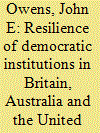

|
|
|
|
|
| Publication |
2012.
|
| Summary/Abstract |
To what extent are democratic institutions resilient when nation states mobilise for war? Normative and empirical political theorists have long argued that wars strengthen the executive and threaten constitutional politics. In modern democracies, national assemblies are supposed to hold the executive to account by demanding explanations for events and policies; and by scrutinising, reviewing and, if necessary, revising legislative proposals intended to be binding on the host society or policies that have been implemented already. This article examines the extent to which the British and Australian parliaments and the United States Congress held their wartime executives to account during World War II. The research finds that under conditions approaching those of total war, these democratic institutions not only continued to exist, but also proved to be resilient in representing public concerns and holding their executives to account, however imperfectly and notwithstanding delegating huge powers. In consequence, executives-more so British and Australian ministers than President Roosevelt-were required to be placatory as institutional and political tensions within national assemblies and between assemblies and executives continued, and assemblies often asserted themselves. In short, even under the most onerous wartime conditions, democratic politics mattered and democratic institutions were resilient.
|
|
|
|
|
|
|
|
|
|
|
|
|
|
|
|
| 20 |
ID:
119478


|
|
|
|
|
| Publication |
2013.
|
| Summary/Abstract |
Many agree that digital technologies are transforming politics. They disagree, however, about the significance and character of that transformation. Many of the pioneers of understanding the distinctive dynamics of new digital media platforms-social media and collaborative production-are quite optimistic about the potential for the Internet to dramatically increase the quality of democratic governance. On the other hand, some political scientists who have examined actual patterns of political activity and expression on digital platforms come away skeptical that digital platforms will bring equality or inclusion to democratic politics. We bring these two opposed perspectives in this article by developing six models of how digital technologies might affect democratic politics: the empowered public sphere, displacement of traditional organizations by new digitally self-organized groups, digitally direct democracy, truth-based advocacy, constituent mobilization, and crowd-sourced social monitoring. Reasoning from the character of political incentives and institutional constraints, we argue that the first three revolutionary and transformative models are less likely to occur than the second three models that describe incremental contributions of technology to politics.
|
|
|
|
|
|
|
|
|
|
|
|
|
|
|
|
|
|
|
|
|